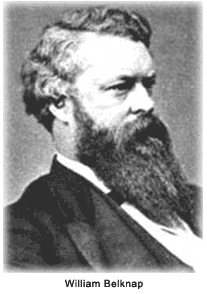A Bad Trade
We begin the first of many scandals that rocked the Grant administration.
A few weeks ago, I began reading a biography of President Ulysses S. Grant. Most Americans do not regard him as a great president, and outside of his heroism and leadership in winning the Civil War, I’ve always had a slightly negative view of him.
Most of that is based on the well-established narrative that Grant was a drunk, corrupt, and unworthy leader who simply lucked into defeating the Confederates during the War of Northern Aggression. When he won the presidency, he became too trusting and loyal, and those around him lined their pockets and stole from the American people.
Even Grant knew his time in the White House was fraught with poor behavior. His autobiography, which I have and will probably read in about 30 years, spans many decades of his ancestry and through the Civil War, but the eight years he served as president was mentioned very little. (That’s what I have heard from people who read it.)
However, I even moved Grant up ten spots from my informal ranking in 2017 to my first official Okay History Presidential ranking. So, the positive seed about my opinion of him has been planted. Soon, yours will be, too.
Around 2016, people who know more about history than I did began to write about Grant’s presidency, focusing on his numerous achievements. I’m sure one day, someone will pen a hit musical about the guy, and Grant’s popularity will soar.
But this is not the time to prop up Grant. This is a scandal ranking and looks at the activities of one cabinet secretary, his sneaky life partners, the power of impeachment, and the devastating effect it had on the lives of American soldiers.
Let’s dive in.
# 35. The Trader Post Scandal
Introduction
Our story begins with a man named William Belknap. Belknap had an easy life. Born in 1829 to a stable family in the state of New York, his father was a career soldier who fought with distinction in the War Against England Part II. Despite sharing the same first name, William was not a junior. He would, however, eventually follow his father’s footsteps when his generation went to war with itself.
After graduating from Princeton and studying law at Georgetown, Belknap headed west and settled in Iowa, of all places, to set up a law practice. Eventually, he ran as a Democrat and served as a representative in the Iowa General Assembly in the late 1850s.
I’m not sure what William did as a kid or what hobbies he developed as a young adult, but I know he collected a few wives. His first, Cora, died in 1862. His second wife, Carita, died in 1870, and he married his third wife, Corarita, in 1873. I’m kidding. His third wife’s name was Amanda. She and Carita were sisters and would prove to play a part in his downfall.
When the Civil War broke out, William served with distinction. From Vicksburg to General Sherman’s March to the Sea, William Belknap built a good reputation and would be well rewarded for it.
Background
When the Civil War ended, President Lincoln was assassinated, and we got stuck with President Andrew Johnson, who gave Belknap the plush job of collecting taxes. Back then, when the government collected taxes, the person doing the collecting was paid a percentage. William kept his books straight, and when Reconstruction began to be implemented, he aligned himself with the Republican Party because he was rich. Duh.
It was here that his old superior officer Grant, now the president himself, having won a surprisingly close election in 1868, gave Belknap the cabinet position of Secretary of War.
Why did Grant do this? I have no idea. The current Secretary of Defense was a news anchor about two months ago, so it’s not like we got better at job placement two hundred years later.
As Secretary of War, Belknap managed the finances, especially purchasing, while conducting minor military affairs. One weird aspect of this job was his ability to hire civilians to operate trader posts on military forts.
These trader posts would sell anything from whiskey to rifles. And do it at inflated prices, which is key when paying off a bunch of people.
In 1870, Belknap named Caleb Mash the Trade Post Guy in charge of Fort Sill in the Oklahoma Territory. The thing was a guy named John Evans already had the job and was making bank selling boots to soldiers that cost a month’s wage, and guns to Native Americans that they would eventually use to shoot the soldiers who wore expensive-ass boots.
William didn’t think it was an issue. Evans could keep his gig as long as he paid Mash, who would kick up cash to Willaim and His Wives. This injection of cash was helpful to the Belknaps back in Washington, DC, who, after Carita died in childbirth, her recently widowed sister Amanda got hitched to her former brother-in-law. Neither she nor William wanted to live as poor people, not with their maid, butler, Amanda’s massive shoe collection, expensive house, or the food they had trucked in all the time for entertainment.
The kickbacks rolled in for a long time. It wasn’t until some random paleontologist met with the Sioux Tribe and discovered that they received frayed blankets, rotten beef, and flour that could be used to floor your basement as items meant to fulfill a treaty the Tribe signed with the United States in 1868.
Paleontologists told the press, and the press exposed the scandal. The Secretary of the Interior resigned, and the press thought, “Who’s next? " It turned out it was Belknap. The kickbacks stopped.
Outcome
The House of Representatives took the collected evidence and impeached Belknap, making him the first cabinet member to be charged. On March 2, 1876, he begged Grant to accept his resignation, which he eventually did when William broke down crying about his dead wife and the living one and how much shame they brought on him and eventually the president.
Yes, he blamed his wives.
The Senate eventually acquitted him by a vote of 37-25, failing to reach the two-thirds majority for removal, mainly because they didn’t think they could do this to a civilian.
Where have we heard that one before? I’m thinking circa 2021.
Reaction
When learning about the scandal, I was shocked to discover the connection between the terrible circumstances of the United States and the Dakota Sioux Tribe.
During the impeachment trial, Lt. Col. George Amstrong Custer testified about how the trader posts were overcharging soldiers while at the same time supplying Native Americans with superior arms. Custer, who had a more distinguished Civil War career than Belknap, also linked President Grant’s brother, Orvil, to scandal, accusing him of running scamming trader posts in other parts of the expanding western territory. President Grant did not like this one bit.
Custer ended up being right about the weapons the Native Americans were getting. A few months after testifying, those rifles, which could shoot multiple rounds without jamming, unlike the ones American soldiers were sold, ended up killing him and 267 others in the Battle of Little Bighorn.
The Trader Post Scandal is not the only Grant Administration scandal you will see on this list. But it is a crazy example of the Gilded Age, where money and poor people got killed. Since Belknap resigned and stayed out of jail, he lived his life out as a lawyer in DC. Nuts.
Okay, so what do you think? Let’s take a poll:
Anonymous and I begin our first season supporting the Washington Spirit of the National Women’s Soccer League this weekend. We are excited to get involved with a team that wins and plays a fun brand of soccer, and home games are just a fifteen-minute walk from home. I’ve tried my best to learn as much as possible to explain it to Anonymous, who has spent zero time on this project.
Blue continues to improve from ear infection problems. I’m not sure if I mentioned that earlier. At this point, I wish he would just learn English and tell me what’s wrong.
I hope everyone has a great weekend! Good luck with your BRACKETS! I’ll be back on Monday. Thanks for your support of Okay History.
Okay,
Chris
INSERT Belknap





I'm sure Grant would have preferred being back at home in St. Louis during the whole time he was President. He was a distinguished military man, no doubt, but in politics he was in way over his head.